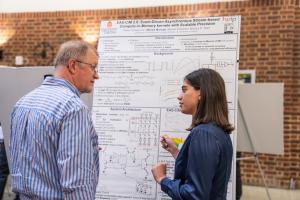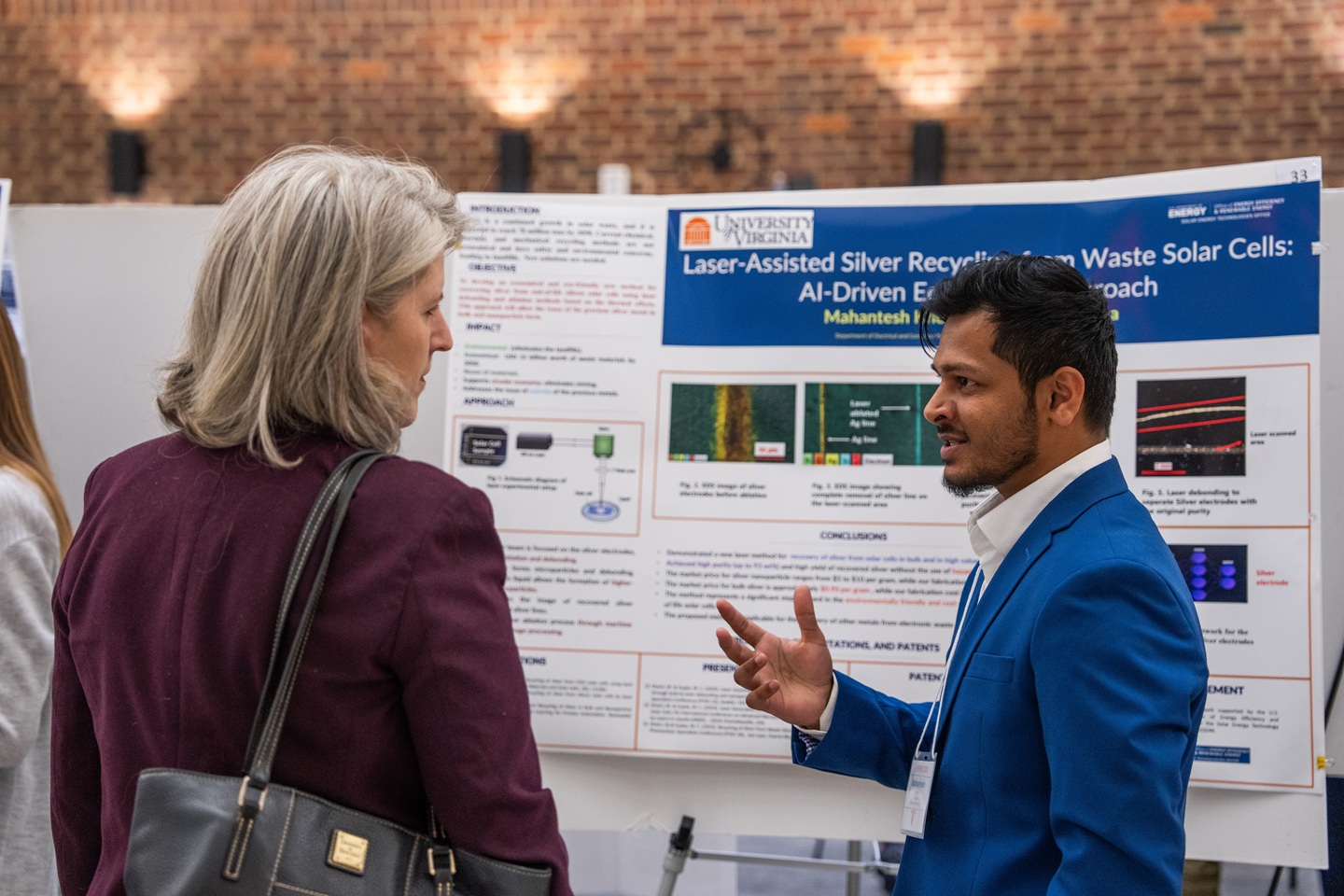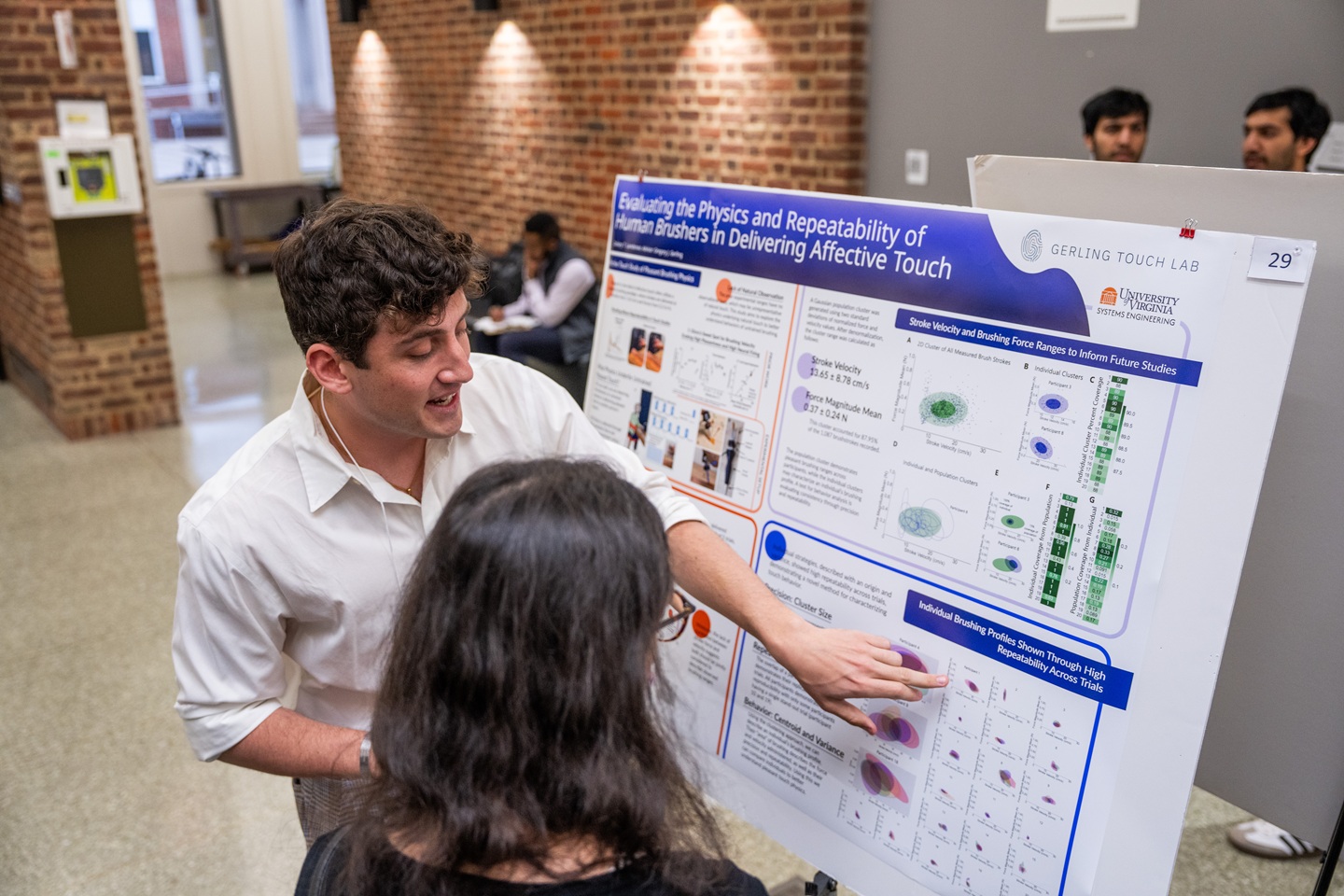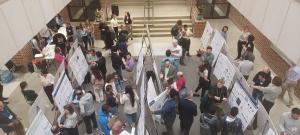
Traditional edge computing devices, which process data within the device or locally, instead of relying on cloud storage, struggle to balance processing speed, accuracy and energy efficiency, especially when running advanced tasks like machine learning.
But what if powerful machine learning models could run directly on these everyday devices? The outcome would improve applications such as health care monitoring, autonomous driving and Internet of Things (IoT) devices, while also making them more energy efficient.
The prospect was just one of the many impressive research papers and posters that graduate students presented at the annual University of Virginia Engineering Student Research Symposium, held in March.
A New Form of Computer Architecture
UVA Engineering and Applied Science student Melika Morsali, who is pursuing her Ph.D. in electrical and electronic engineering, won two awards — in Computer Engineering, and People’s Choice for Engaging Poster and Presentation.
Morsali thinks that she and collaborators in the High-Performance Low-Power Lab, including her doctoral supervisor, professor Mircea R. Stan, may have found a solution to optimizing machine learning for edge devices in the form of a new computing architecture they call EAS-CiM 2.0.
“This architecture performs computations directly within memory and dynamically adjusts its precision and speed according to the workload demands,” Morsali said.
The architecture involves an asynchronous stream that allows devices to do better computations within stored memory. Also, an internal algorithm, which can be updated for specific tasks, adjusts to manage the trade-offs between latency, accuracy and energy.
“By tuning key parameters such as observation periods [during which researchers examine performance for the purpose of refinement], and stream frequency, we achieve precision scaling without adding extra hardware costs,” Morsali said.

The Complete List of Winners
UVERS is the Graduate Engineering Student Council’s flagship annual event. Other diverse topics included laser-based solar panel cleanup, seat-belt safety and touch sensor research.
The winners were:
Biomedical Engineering
Yonatan Degefu, advised by Mohammad Fallahi-Sichani, for “Identifying mechanistic regulators of the AP-1 state heterogeneity via computational modeling and multiplexed single cell analysis.”
Chemical Engineering
Joseph Maliakkal, advised by Lakeshia Taite and Kyle Lampe, “Effect of endothelial cells on oligodendrocyte progenitor cell morphology.”
Civil and Environmental Engineering
Nafisa Ahmed, advised by Lisa Colosi Peterson, “Assessing the viability of engineered and nature-based carbon dioxide removal (CDR) technology for net-zero emission goals: A county-level analysis in Virginia.”
Computer Science
Farzana Ahmad, advised by Geoffrey Fox, “Knowledge guided autoregressive diffusion model for fast calorimeter shower simulation.”
Computer Engineering
Melika Morsali, advised by Mircea Stan, “EAS-CiM 2.0: Event-driven asynchronous stream-based compute-in-memory kernels with scalable precision.” (People's Choice for Engaging Poster and Presentation)
Electrical Engineering
Mahantesh Khetri, advised by Mool Gupta, “Laser-assisted silver recycling from waste solar cells: AI-driven economical approach.”
Materials Science and Engineering
Liron Shvilberg, advised by Jon Ihlefeld, “Oxygen diffusion coefficients in ferroelectric hafnium zirconium oxide films.”
Mechanical and Aerospace Engineering
Keri-Anne Lue, advised by Jason Forman, for “Seat belt fit and body position of pregnant female automobile occupants: An exploratory study.”
Systems Engineering
Zackary Landsman, advised by Greg Gerling, “Evaluating the physics and repeatability of human brushers in delivering affective touch.”

GESC Aids Grad Student Journeys
The Graduate Engineering Student Council exists to improve the quality of the graduate engineering experience. Matthew B. Panzer, associate dean for graduate education and post-doctoral affairs, congratulated the council on another successful symposium.
“GESC created a well-organized event with a great atmosphere of engagement and discussion among the presenters and attendees,” Panzer said. “UVERS is key to our mission of promoting graduate student research and academic excellence, and it is a fantastic forum that showcases the talent and dedication of our graduate students across all the disciplines within UVA Engineering. We’re all proud of our students’ contributions to science and look forward to continuing to support their growth through more events like this.”
